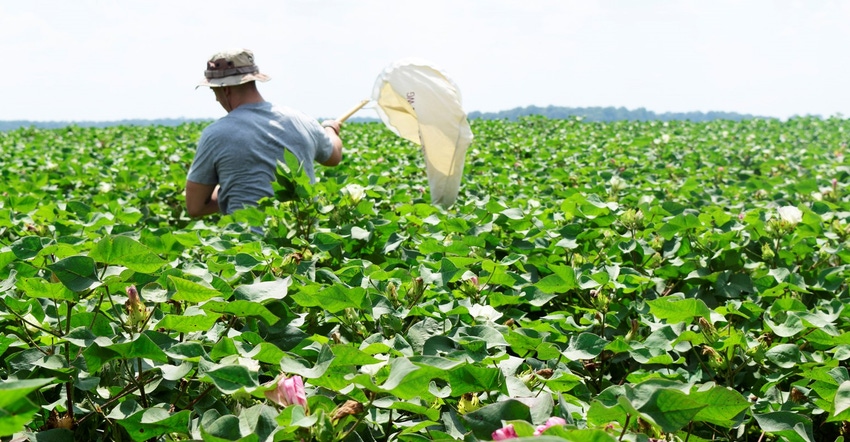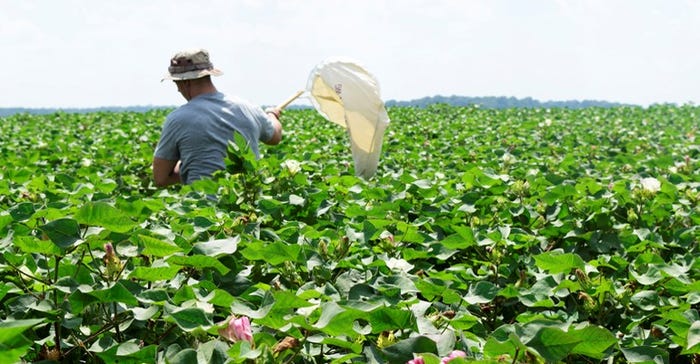June 1, 2018

Sponsored Content
Cotton is experiencing a resurgence in the Midsouth. With the success of the boll weevil eradication program comes a shift in major cotton insect pests, and tarnished plant bug has moved to the top of the list of worrisome pests.
“It’s difficult to accurately predict pest pressure, but we know we’ll have tarnished plant bug pressure no matter what,” says Angus Catchot, Mississippi State University Extension professor. There are steps cotton growers can take to minimize the devastating impact tarnished plant bug populations can have on yield.
Unfortunately, there is a huge reservoir of host plants for the tarnished plant bug. Almost all flowering plants serve as a host for tarnished plant bug, particularly broadleaf plants, including Palmer amaranth.
Monitor host plants
Catchot says when surveying ditch banks for weeds, he suggests first determining what species are present and whether they are host plants to insects such as tarnished plant bug. As neighboring crops emerge and ditches are mowed, plant bug populations can move to cotton fields.
Since any activity in adjacent fields or ditches can affect plant bug populations, be aware if you are cleaning those areas, especially prior to squaring. Cotton fields that border maturing fields of corn, sorghum or soybeans tend to have the highest plant bug populations. Catchot says in such situations, it can be helpful to scout and manage those field borders independently. Those areas may require spot treatments that may not be necessary for an entire field.

Scout early, scout often
It’s important for growers to scout early and often, and monitor square retention prior to flowering when adult pests are migrating to cotton fields. Sampling techniques and thresholds for this pest differ depending on timing, but pay close attention to what local Extension specialists are saying regarding emerging populations.
While there are many cultural practices such as early planting, hairy leaf varieties, and blocking cotton away from corn, another challenge growers may face is the potential for resistance or tolerance to certain chemistries. Implementing an Integrated Pest Management program is critical to ensuring tarnished plant bug populations remain below the economic injury level. Scouting regularly and applying an insecticide at the optimum time is key, as is rotating chemistries to fight resistance and limiting trips across the field.
Transform® WG insecticide can serve as the foundation of your IPM program, because it provides fast and effective control of the tarnished plant bug and is not likely to flare spider mites. For the majority of Midsouth states, Transform has been approved for use in 2018 under a Section 18 Emergency Use Exemption.
“We are excited to have Transform as a tool in our bag this season. We are relieved we have it. If we hadn’t gotten it, tarnished plant bug control would be another story entirely,” Catchot says.
To learn more about threshold levels in your area, contact your local Extension agent. To find out more about section 18 status updates for Transform, visit www.TransformMyCotton.com.
®Trademark of The Dow Chemical Company (“Dow”) or E. I. du Pont de Nemours and Company (“DuPont”) or affiliated companies of Dow or DuPont.
Transform WG is not registered by U.S. EPA for sale or use on cotton. Transform has Section 18 Specific Emergency Exemptions for use on cotton in Arkansas, Arizona, California, Louisiana, Mississippi, Missouri, Tennessee, Texas and select counties in Alabama. To learn more about Transform, to see which states or political subdivisions thereof have Section 18 Specific Emergency Exemptions, to see the limitations on the use of Transform under the Section 18 Specific Emergency Exemption labels, and to find a list of retailers that may carry this product under a Section 18 exemption, call 800-258-3033 or email [email protected]. Always read and follow label directions.
©2018 Dow AgroSciences LLC L53-396-035 (06/18) BR DAAG8TFRM060
About the Author(s)
You May Also Like




